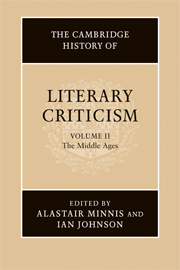Book contents
- Frontmatter
- Introduction
- I THE LIBERAL ARTS AND THE ARTS OF LATIN TEXTUALITY
- II THE STUDY OF CLASSICAL AUTHORS
- III TEXTUAL PSYCHOLOGIES: IMAGINATION, MEMORY, PLEASURE
- IV VERNACULAR CRITICAL TRADITIONS: THE EARLY MIDDLE AGES
- V VERNACULAR CRITICAL TRADITIONS: THE LATE MIDDLE AGES
- VI LATIN AND VERNACULAR IN ITALIAN LITERARY THEORY
- 20 Dante Alighieri: experimentation and (self-)exegesis
- 21 The Epistle to Can Grande
- 22 The Trecento commentaries on Dante's Commedia
- 23 Latin and vernacular from Dante to the age of Lorenzo (1321–c. 1500)
- 24 Humanist views on the study of poetry in the early Italian Renaissance
- 25 Humanist criticism of Latin and vernacular prose
- VII BYZANTINE LITERARY THEORY AND CRITICISM
- Bibliography
- Index
- References
23 - Latin and vernacular from Dante to the age of Lorenzo (1321–c. 1500)
from VI - LATIN AND VERNACULAR IN ITALIAN LITERARY THEORY
Published online by Cambridge University Press: 28 March 2008
- Frontmatter
- Introduction
- I THE LIBERAL ARTS AND THE ARTS OF LATIN TEXTUALITY
- II THE STUDY OF CLASSICAL AUTHORS
- III TEXTUAL PSYCHOLOGIES: IMAGINATION, MEMORY, PLEASURE
- IV VERNACULAR CRITICAL TRADITIONS: THE EARLY MIDDLE AGES
- V VERNACULAR CRITICAL TRADITIONS: THE LATE MIDDLE AGES
- VI LATIN AND VERNACULAR IN ITALIAN LITERARY THEORY
- 20 Dante Alighieri: experimentation and (self-)exegesis
- 21 The Epistle to Can Grande
- 22 The Trecento commentaries on Dante's Commedia
- 23 Latin and vernacular from Dante to the age of Lorenzo (1321–c. 1500)
- 24 Humanist views on the study of poetry in the early Italian Renaissance
- 25 Humanist criticism of Latin and vernacular prose
- VII BYZANTINE LITERARY THEORY AND CRITICISM
- Bibliography
- Index
- References
Summary
The previous chapter stressed the ways in which Dante's achievement represented a challenge to prevailing orthodoxies: he had chosen the vernacular for a major poetic work, and the Commedia itself had engendered a tradition of commentary on a par with that usually reserved for classical texts. Petrarch's literary hegemony, which from 1350 onwards restored Latin to its privileged position, in a sense constituted a linguistic counterrevolution. The rivalry between the two languages was to continue for two centuries from the death of Dante, and since it represents an obligatory topic in critical thinking in this period it seems best to treat the question in this separate chapter. There are four major stages in the debate: first the Petrarchan revolution; second the arguments for and against the vernacular around 1400; third the crucial decade 1430–40; and finally the age of Landino, Poliziano and Lorenzo de’ Medici.
The conflicting currents, set in motion on the one hand by Dante's enhancement of the status of the volgare and on the other by the new humanist conviction of the superiority of Latin, were already visible in Dante's last years in his exchange of Latin hexameters with Giovanni del Virgilio (c. 1320). Giovanni criticised Dante for writing serious poetry for the masses, bemoaning their ignorance, their tendency to distort the poet's words in the street, and the fact that the vernaculars are too many and transitory to be the vehicle of serious work (Eclogues 1.6–16). Dante replied to Giovanni in the same metre but reviving the ancient genre of the eclogue (Eclogue 2), possibly to couch the content of his reply (defence of the layman's language and the comic genre of the Commedia) in an appropriate form (pastoral was the lowest genre, according to the rota Virgilii; see p. 517 above).
- Type
- Chapter
- Information
- The Cambridge History of Literary Criticism , pp. 612 - 625Publisher: Cambridge University PressPrint publication year: 2005
References
- 1
- Cited by

